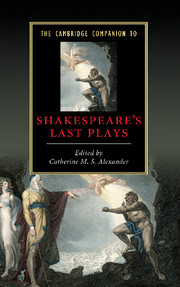Book contents
- Frontmatter
- Introduction
- 1 What is a ‘late play’?
- 2 Blackfriars, music and masque: theatrical contexts of the last plays
- 3 The literary and dramatic contexts of the last plays
- 4 Politics, religion, geography and travel: historical contexts of the last plays
- 5 ‘You speak a language that I understand not’: listening to the last plays
- 6 The Winter’s Tale: shifts in staging and status
- 7 Cymbeline: the afterlife
- 8 Literary invocations of The Tempest
- 9 Pericles: the afterlife
- 10 The Two Noble Kinsmen and King Henry VIII: the last last plays
- Further reading: Clare Smout
- Index
7 - Cymbeline: the afterlife
Published online by Cambridge University Press: 28 May 2010
- Frontmatter
- Introduction
- 1 What is a ‘late play’?
- 2 Blackfriars, music and masque: theatrical contexts of the last plays
- 3 The literary and dramatic contexts of the last plays
- 4 Politics, religion, geography and travel: historical contexts of the last plays
- 5 ‘You speak a language that I understand not’: listening to the last plays
- 6 The Winter’s Tale: shifts in staging and status
- 7 Cymbeline: the afterlife
- 8 Literary invocations of The Tempest
- 9 Pericles: the afterlife
- 10 The Two Noble Kinsmen and King Henry VIII: the last last plays
- Further reading: Clare Smout
- Index
Summary
Two anecdotes attest to the emotional power of Cymbeline. Charles Cowden Clarke recalls seeing a young John Keats in the early 1800s reading the play aloud and noticing his eyes filling with tears, 'And for some moments he was unable to proceed, when he came to the departure of Posthumus, and Imogen's saying she would have watched him . . . “till he had melted from / The smallness of a gnat to air”' (1.3.21-2), and it is often said that Tennyson felt such affection for the play that at his death in October 1892 he was buried with a copy of Cymbeline in his hand. A letter to the New York Times of 23 April 1910 from William M. St John went further and insisted, with no evidence at all, that 'in the poet's last moments his finger rested on “'Fear no more the heat o' the sun.”' The afterlife and reception of the play, however, is characterised less by such testimonials to affect than the enduring, critical reaction of Samuel Johnson (and his commentary will recur throughout this essay). In the Notes that he compiled between 1745 and 1765 and added to his edition of Shakespeare Johnson acknowledged that Cymbeline has 'many just sentiments, some natural dialogues and some pleasing scenes, but they are obtained at the expense of much incongruity' and concluded, 'To remark the folly of the fiction, the absurdity of the conduct, the confusion of the names and manners of different times, and the impossibility of events in any system of life, were to waste criticism upon unresisting imbecility, upon faults too evident for detection, and too gross for aggravation'.
- Type
- Chapter
- Information
- The Cambridge Companion to Shakespeare's Last Plays , pp. 135 - 154Publisher: Cambridge University PressPrint publication year: 2009

